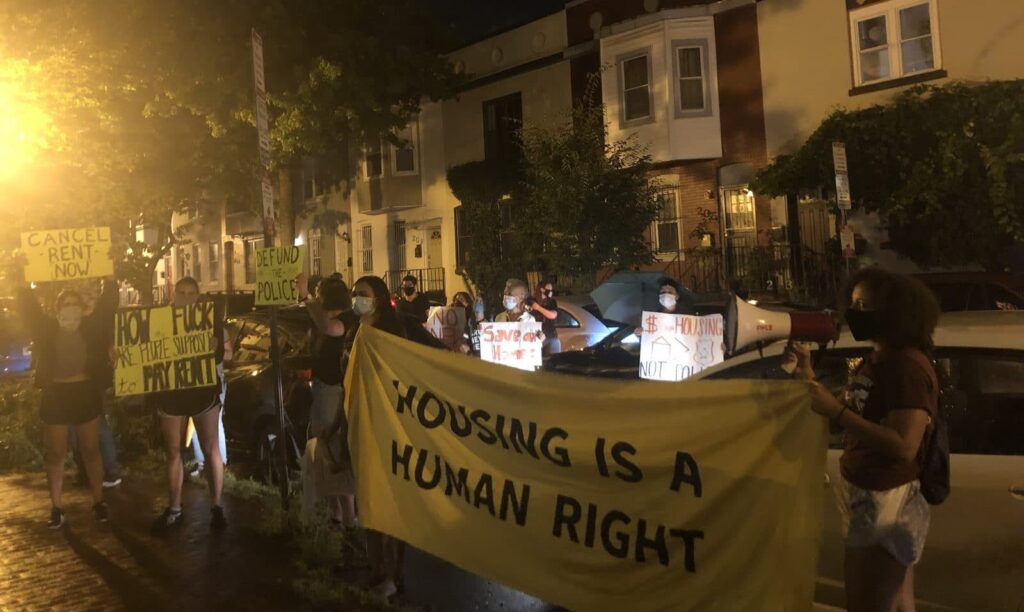Around 30 protesters marched and rallied outside the house of At-Large Councilmember Anita Bonds,, on the night of Tuesday, July 21. Bonds chairs chair the D.C. Council Committee on Housing and Neighborhood Revitalization. They called on her and the council to cancel rent for D.C. residents and defund the Metropolitan Police Department.
The rally demanded full rent and mortgage forgiveness for D.C. residents for the duration of the public health crisis, as a well as a prohibition on evictions for those who cannot pay. The event was organized by ONE D.C., a grassroots organization working toward racial and economic equity in the District, and supported by the D.C. arm of the Sunrise Movement, a youth group to end the climate crisis.
The crowd marched down Bates Street NW at midnight banging pots, pans and tambourines, and carrying signs. They chanted “Tenant Power,” “Black Lives Matter,” “Cancel the Rent,” and “No Justice No Sleep,” as cars honked. They stopped outside Bonds’s home.
“The pandemic has left thousands of D.C. residents — the majority of them Black — without work, without money, without food and without protections,” Aura Angélica, an organizer from the Sunrise Movement, said to the crowd in both Spanish and English. “The idea that someone who’s lost everything during a health crisis has to pay thousands of dollars in back-rent just to continue living under their roof is frankly an absurd and inhumane one.”
[Read more: Tenants withholding payments urge DC Council to cancel rent]
Black and brown residents have been the most hurt by the pandemic, both physically and economically, and will be the most hurt and displaced if forced to pay their rent, multiple speakers said.
“We are on the brink of an exodus of Black and brown folks the likes of which D.C. has never seen. And that’s saying something in the most intensely gentrifying city in the whole nation,” said Patrick Gregoire, an organizer from ONE D.C. “As long as the council refuses to do the right thing, which is to provide proper rent relief, there will be no sleep for these city councilmembers.”
The displacement of Black residents has been occurring for years in the District before this current pandemic. A study released by the National Community Reinvestment Coalition last year found that D.C. has the most intense rate of gentrification in the country. Roughly 20,000 Black residents were displaced between the years 2000 and 2013.
Racial inequity in D.C. may not have been caused by the pandemic, but it has been exacerbated by it, multiple speakers emphasized.
“COVID-19 has only highlighted and made evident the generations worth of injustices and oppression that the government of D.C. has for years created and sustained. For years, D.C. government has worked against our communities of color, our undocumented residents and our poor residents,” Angélica said. “Between the presence of MPD in our schools, the over policing of BIPOC communities, the willful gentrification at the hands of housing lobbyists — D.C. has become one of the most oppressive cities to live in as BIPOC.”
[Read more: Limiting police power in schools is a win for some and a step back for others]
Rent was too high for many D.C. residents even before the pandemic, said Pauline Dixon, a D.C. resident and Howard University alumna who participated in the rally..
“There’s people out here that work every day, barely making it, before all of this happened, before coronavirus,” Dixon said. “Y’all are tearing down public housing as it is, native Washingtonians can barely exist as it is, and y’all are pushing them out. I’ve been here 10 years, I’ve still never seen anything like this.”
According to Gregoire, Bonds has the power to fulfill ONE D.C.’s demands. But any such legislation would need majority support from the council before going to the mayor for her signature. Bonds did not come out and interact with the protesters who were outside her home for about an hour. Her office also did not respond to requests for comment from Street Sense Media.
Thus far, the council’s coronavirus relief bills have included prohibition of evictions, rent increases, and fees for late rent payments for tenants. They also placed a moratorium on foreclosures, required mortgage lenders to develop a deferment program that allows borrowers to postpone payments for at least three months and directed landlords to develop payment plans for and rent owed for the period of the public health crisis and one year afterward. Through a federal grant, the city’s Department of Housing and Community Development has also set up a COVID-19 rental assistance program for “low-income renters who are in arrears.” However, direct rent relief or forgiveness has yet to be included. The Brookings Institution estimated it would cost nearly $5.2 million to cover rent for one month for those most likely to lose their housing in D.C.

One D.C. was advocating for rent relief to be funded by reallocating some of MPD’s budget. The Fiscal Year 2021 budget approved on July 23, two days after the protest, included $578 million for MPD, down from its current budget of $611 million. That amount of funding exceeds what is allotted to the D.C. Housing Authority, Department of Employment Services, Health Department, and University of the District of Columbia combined, Gregoire noted. D.C. Council is now on recess until Sept. 7.
“It is a racial and economic justice issue. For decades, MPD has disproportionately targeted and arrested Black people in D.C.,” he said. “I don’t know what the cops are doing that’s more important than our health, our education, our right to work and the right to housing.”








